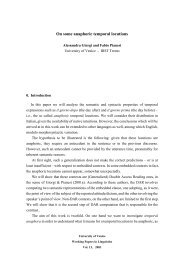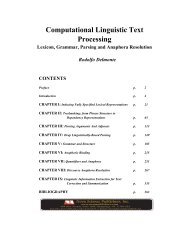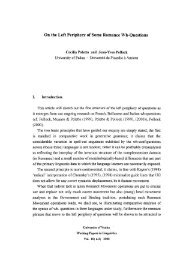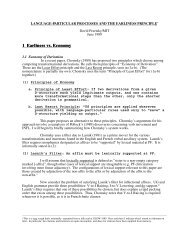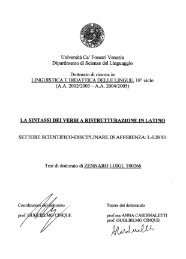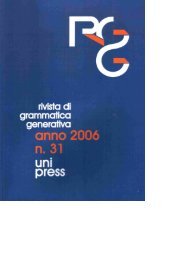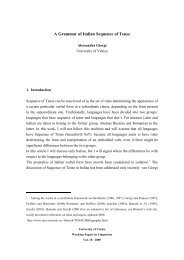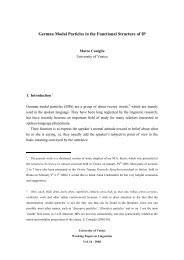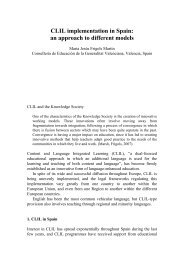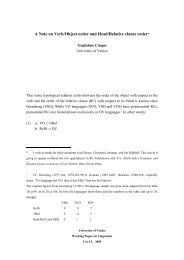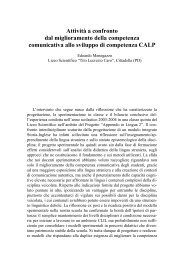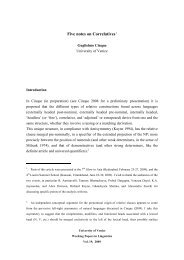1 GAPS, GHOSTS AND GAPLESS RELATIVES IN ... - ling.auf.net
1 GAPS, GHOSTS AND GAPLESS RELATIVES IN ... - ling.auf.net
1 GAPS, GHOSTS AND GAPLESS RELATIVES IN ... - ling.auf.net
You also want an ePaper? Increase the reach of your titles
YUMPU automatically turns print PDFs into web optimized ePapers that Google loves.
One is for in to be ghosted in order to avoid a PP with an overt head and specifier,<br />
and for that also to be ghosted in order to avoid a CP with an overt head and specifier: this<br />
would derive a silent preposition structure like (40). A second is for the whole PP [PP which<br />
[P in] ] to be ghosted, resulting in a that-clause structure with a silent preposition<br />
like (42). A third is for both the PP specifier and the complementiser that to be ghosted, so<br />
deriving the structure shown in simplified form below:<br />
(44) [CP [PP [P ] ] [C ] the Scotland players will raise<br />
their game ]<br />
(44) is then the superficial structure of the italicised relative clause in (12g) 9 .<br />
The Ghosting analysis outlined here proves superior to the silent stranded<br />
preposition analysis sketched in the previous section in respect of overcoming all three<br />
problems which beset that analysis, viz. (i) the interpretive problem, (ii) the distributional<br />
problem, and (iii) the stranding problem. The interpretive asymmetry between ‘silent<br />
prepositions’ in standard English (which are restricted to having a place/time/manner<br />
interpretation) and ghosted prepositions in spoken English (which can have an unrestricted<br />
interpretation) can be accounted for by positing that ghosted prepositions have an<br />
unrestricted range of possible interpretations precisely because any preposition can be<br />
ghosted. The Ghosting analysis also provides a principled account of distributional<br />
differences between ghosted prepositions in spoken English (which occur only in relative<br />
clauses) and silent prepositions in standard English (which occur in relatives, interrogatives<br />
and adverbial NPs) by positing that Ghosting only occurs with relative pronouns in spoken<br />
English because these are ‘light’ constituents which have developed caseless variants (see<br />
below for a fuller account). Finally, the Ghosting analysis also accounts for why<br />
prepositions which can’t be stranded can no<strong>net</strong>heless be ghosted by positing that ghosted<br />
prepositions undergo pied-piping 10 .<br />
Since gapless relatives are characteristic of spoken rather than written English, an<br />
important question arising from our analysis is what differences exist between spoken and<br />
written English which allow prepositional constituents to be ghosted in informal registers<br />
of spoken English but not in formal registers of written English. In this connection, it<br />
should be noted that Collins (2007) suggests that only light nouns (i.e. ‘defective’ nouns<br />
with limited semantic and grammatical content) can land in spec-PP by Prepositional<br />
Inversion and trigger Preposition Ghosting, whereas other constituents can only transit<br />
through spec-PP (when being extracted out of PP). Collins also argues (2007: 19) that the<br />
noun home in expressions like He stayed home is a light noun which originates as the<br />
complement of the preposition at, but thereafter moves to become the specifier of at, so<br />
forming the structure [PP home [P at] ]; subsequent Ghosting of at derives the<br />
structure [PP home [P ] ]. He further suggests (ibid.) that light nouns like home<br />
lack case, and that the preposition at in such structures ‘checks no case feature’ (Collins,<br />
2007: 19). He claims that that r-pronouns incorporate the light noun PLACE (so that where<br />
has a more abstract structure paraphraseable as WHAT PLACE), and notes that expressions<br />
incorporating the light noun PLACE allow Inversion and Ghosting (as in ‘We went<br />
someplace different’), although he concedes (2007: 11) that ‘I do not have any answer at<br />
this point to the deeper question of what drives movement of light noun place/PLACE<br />
(including the r-pronouns) into Spec P’.<br />
14



